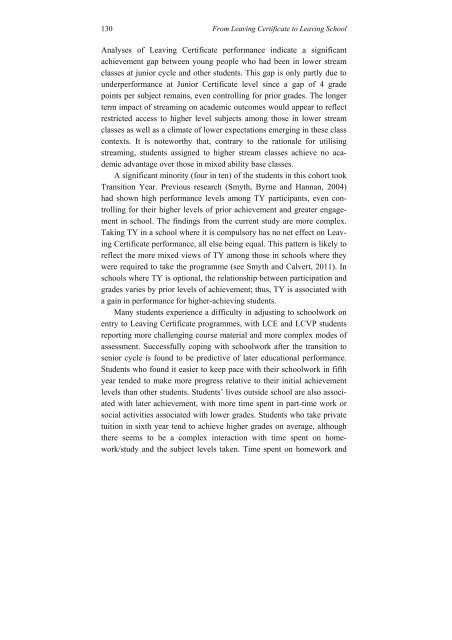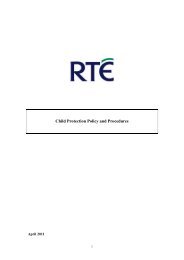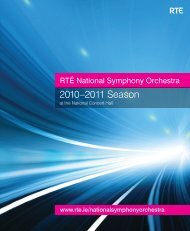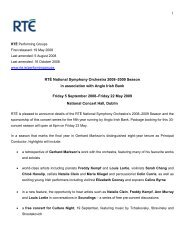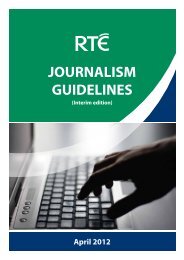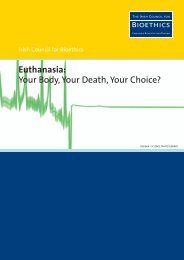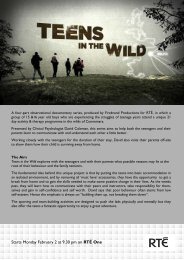From Leaving CertiFiCate to Leaving SChooL a Longitudinal Study ...
From Leaving CertiFiCate to Leaving SChooL a Longitudinal Study ...
From Leaving CertiFiCate to Leaving SChooL a Longitudinal Study ...
You also want an ePaper? Increase the reach of your titles
YUMPU automatically turns print PDFs into web optimized ePapers that Google loves.
130<br />
<strong>From</strong> <strong>Leaving</strong> Certificate <strong>to</strong> <strong>Leaving</strong> School<br />
Analyses of <strong>Leaving</strong> Certificate performance indicate a significant<br />
achievement gap between young people who had been in lower stream<br />
classes at junior cycle and other students. This gap is only partly due <strong>to</strong><br />
underperformance at Junior Certificate level since a gap of 4 grade<br />
points per subject remains, even controlling for prior grades. The longer<br />
term impact of streaming on academic outcomes would appear <strong>to</strong> reflect<br />
restricted access <strong>to</strong> higher level subjects among those in lower stream<br />
classes as well as a climate of lower expectations emerging in these class<br />
contexts. It is noteworthy that, contrary <strong>to</strong> the rationale for utilising<br />
streaming, students assigned <strong>to</strong> higher stream classes achieve no academic<br />
advantage over those in mixed ability base classes.<br />
A significant minority (four in ten) of the students in this cohort <strong>to</strong>ok<br />
Transition Year. Previous research (Smyth, Byrne and Hannan, 2004)<br />
had shown high performance levels among TY participants, even controlling<br />
for their higher levels of prior achievement and greater engagement<br />
in school. The findings from the current study are more complex.<br />
Taking TY in a school where it is compulsory has no net effect on <strong>Leaving</strong><br />
Certificate performance, all else being equal. This pattern is likely <strong>to</strong><br />
reflect the more mixed views of TY among those in schools where they<br />
were required <strong>to</strong> take the programme (see Smyth and Calvert, 2011). In<br />
schools where TY is optional, the relationship between participation and<br />
grades varies by prior levels of achievement; thus, TY is associated with<br />
a gain in performance for higher-achieving students.<br />
Many students experience a difficulty in adjusting <strong>to</strong> schoolwork on<br />
entry <strong>to</strong> <strong>Leaving</strong> Certificate programmes, with LCE and LCVP students<br />
reporting more challenging course material and more complex modes of<br />
assessment. Successfully coping with schoolwork after the transition <strong>to</strong><br />
senior cycle is found <strong>to</strong> be predictive of later educational performance.<br />
Students who found it easier <strong>to</strong> keep pace with their schoolwork in fifth<br />
year tended <strong>to</strong> make more progress relative <strong>to</strong> their initial achievement<br />
levels than other students. Students’ lives outside school are also associated<br />
with later achievement, with more time spent in part-time work or<br />
social activities associated with lower grades. Students who take private<br />
tuition in sixth year tend <strong>to</strong> achieve higher grades on average, although<br />
there seems <strong>to</strong> be a complex interaction with time spent on homework/study<br />
and the subject levels taken. Time spent on homework and


